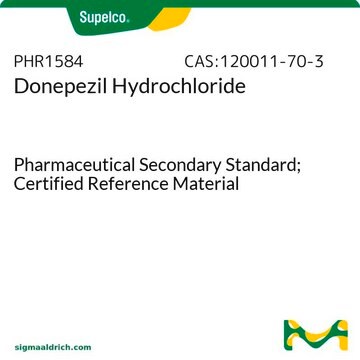D6821
Donepezil hydrochloride
≥98% (HPLC), powder, acetylcholinesterase inhibitor
Sinonimo/i:
1H-Inden-1-one, 2,3-dihydro-5,6-dimethoxy-2-[[1-(phenylmethyl)-4-piperidinyl]methyl]-, hydrochloride, E2020
About This Item
Prodotti consigliati
product name
Donepezil hydrochloride, ≥98% (HPLC)
Saggio
≥98% (HPLC)
Forma fisica
powder
Condizioni di stoccaggio
desiccated
Colore
white to off-white
Solubilità
DMSO: ≥20 mg/mL
H2O: ≥20 mg/mL
Temperatura di conservazione
room temp
Stringa SMILE
O=C1C(CC2CCN(CC3=CC=CC=C3)CC2)CC4=CC(OC)=C(OC)C=C41.[H]Cl
InChI
1S/C24H29NO3.ClH.H2O/c1-27-22-14-19-13-20(24(26)21(19)15-23(22)28-2)12-17-8-10-25(11-9-17)16-18-6-4-3-5-7-18;;/h3-7,14-15,17,20H,8-13,16H2,1-2H3;1H;1H2
HLJIZAKUNCTCQX-UHFFFAOYSA-N
Informazioni sul gene
human ... ACHE(43)
Cerchi prodotti simili? Visita Guida al confronto tra prodotti
Applicazioni
Azioni biochim/fisiol
Caratteristiche e vantaggi
Avvertenze
Danger
Indicazioni di pericolo
Consigli di prudenza
Classi di pericolo
Acute Tox. 2 Oral - Eye Irrit. 2
Codice della classe di stoccaggio
6.1A - Combustible acute toxic Cat. 1 and 2 / very toxic hazardous materials
Classe di pericolosità dell'acqua (WGK)
WGK 3
Punto d’infiammabilità (°F)
Not applicable
Punto d’infiammabilità (°C)
Not applicable
Certificati d'analisi (COA)
Cerca il Certificati d'analisi (COA) digitando il numero di lotto/batch corrispondente. I numeri di lotto o di batch sono stampati sull'etichetta dei prodotti dopo la parola ‘Lotto’ o ‘Batch’.
Possiedi già questo prodotto?
I documenti relativi ai prodotti acquistati recentemente sono disponibili nell’Archivio dei documenti.
I clienti hanno visto anche
Il team dei nostri ricercatori vanta grande esperienza in tutte le aree della ricerca quali Life Science, scienza dei materiali, sintesi chimica, cromatografia, discipline analitiche, ecc..
Contatta l'Assistenza Tecnica.









![(E)-2-[(1-Benzylpiperidin-4-yl)methylene]-5,6-dimethoxyindan-1-one(Donepezil Related Compound A) Pharmaceutical Secondary Standard; Certified Reference Material](/deepweb/assets/sigmaaldrich/product/images/201/641/49c7b91b-630d-4c54-9fe2-8ac8e483c7cd/640/49c7b91b-630d-4c54-9fe2-8ac8e483c7cd.jpg)
